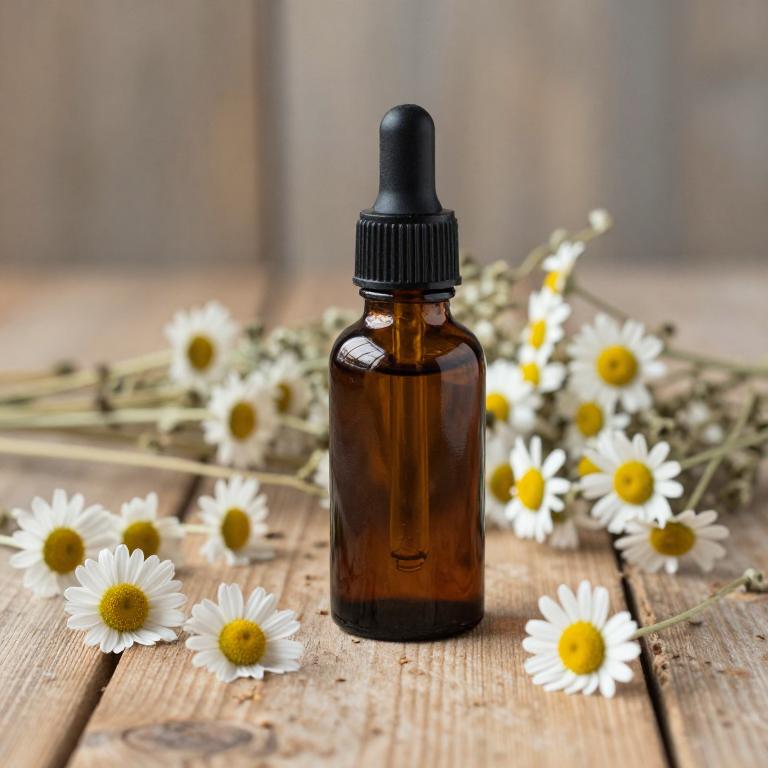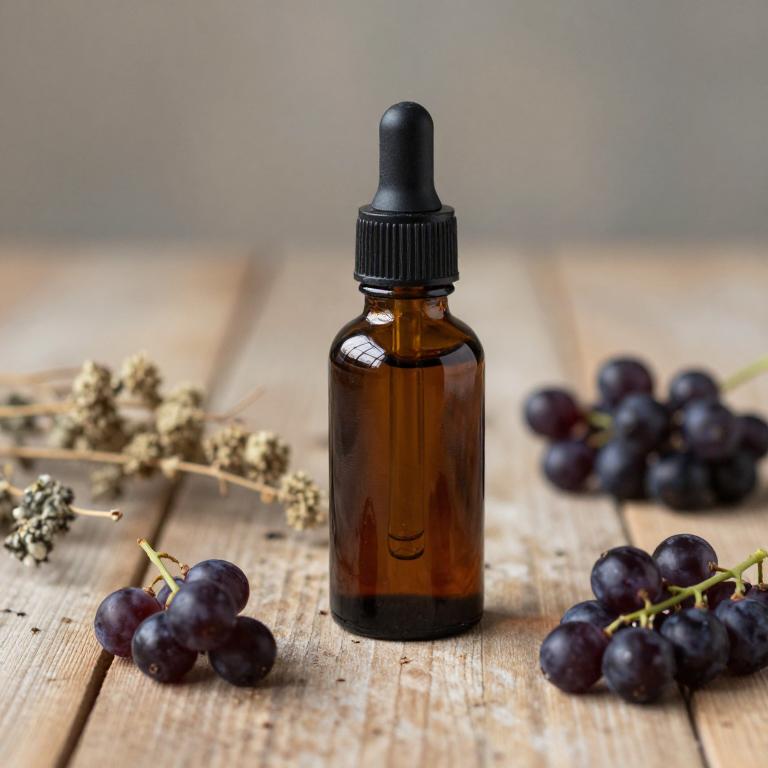10 Best Herbal Tinctures For Gerd

Herbal tinctures for GERD, or gastroesophageal reflux disease, are concentrated liquid extracts made from various plants believed to support digestive health and reduce acid reflux symptoms.
Commonly used herbs include ginger, licorice root, fennel, and chamomile, each offering properties that may soothe the esophagus and promote digestion. These tinctures are typically taken orally, often diluted in water or another liquid, to help neutralize stomach acid and ease inflammation. While they can be a natural alternative to conventional medications, it is important to consult a healthcare provider before use, especially if you are on other medications or have underlying health conditions.
Overall, herbal tinctures may offer a gentler approach to managing GERD symptoms when used as part of a holistic treatment plan.
Table of Contents
- 1. Chamomile (Matricaria chamomilla)
- 2. Ginger (Zingiber officinale)
- 3. Thistle (Silybum marianum)
- 4. Licorice (Glycyrrhiza glabra)
- 5. Common grape (Vitis vinifera)
- 6. Fennel (Foeniculum vulgare)
- 7. Stinging nettle (Urtica dioica)
- 8. Turmeric (Curcuma longa)
- 9. Dog rose (Rosa canina)
- 10. Blessed thistle (Cnicus benedictus)
1. Chamomile (Matricaria chamomilla)

Matricaria chamomilla, commonly known as chamomile, is often used in herbal tinctures to support digestive health and alleviate symptoms of gastroesophageal reflux disease (GERD).
The tincture contains active compounds such as alpha-bisabolol and flavonoids, which have anti-inflammatory and antispasmodic properties that may help reduce stomach acid reflux and soothe the esophageal lining. When taken orally, chamomile tinctures can promote relaxation of the lower esophageal sphincter, potentially preventing the backward flow of stomach contents. However, it is important to consult a healthcare professional before use, especially for individuals with allergies or those taking other medications.
While not a cure for GERD, chamomile tinctures may serve as a complementary therapy to support overall digestive wellness.
2. Ginger (Zingiber officinale)

Zingiber officinale, commonly known as ginger, has been widely used in traditional medicine for its digestive and anti-inflammatory properties.
Ginger tinctures, derived from the rhizome of the plant, are often utilized to alleviate symptoms associated with gastroesophageal reflux disease (GERD), such as heartburn and indigestion. The active compounds in ginger, including gingerol and shogaol, may help reduce stomach acid production and soothe the lining of the esophagus. When taken in appropriate doses, ginger tinctures can offer a natural and complementary approach to managing GERD symptoms.
However, it is advisable to consult a healthcare professional before incorporating ginger tinctures into a treatment regimen, especially for individuals with existing health conditions or those taking medications.
3. Thistle (Silybum marianum)

Silybum marianum, also known as milk thistle, is a herbal remedy commonly used in the form of a tincture to support liver function and digestive health.
For individuals suffering from gastroesophageal reflux disease (GERD), silybum marianum tinctures may help by reducing inflammation and promoting the healing of the digestive tract. The active compound, silymarin, is believed to have antioxidant and anti-inflammatory properties that can protect the stomach and esophageal lining. While some studies suggest potential benefits, it is important to consult a healthcare provider before using it as a complementary therapy for GERD.
As with any herbal supplement, dosage and potential interactions with other medications should be carefully considered.
4. Licorice (Glycyrrhiza glabra)

Glycyrrhiza glabra, commonly known as licorice root, is a herbal remedy often used in tincture form to support digestive health, particularly for individuals suffering from gastroesophageal reflux disease (GERD).
The active compound in licorice root, glycyrrhizin, exhibits anti-inflammatory and mucoprotective properties that may help reduce irritation and inflammation in the esophagus and stomach lining. When prepared as a tincture, licorice root is typically diluted in alcohol, making it easier to absorb and use regularly. However, long-term use of licorice root tinctures can lead to side effects such as hypertension due to its effect on the adrenal glands, so it should be used under the guidance of a healthcare professional.
Despite these considerations, many people find licorice root tinctures beneficial in alleviating GERD symptoms when used appropriately.
5. Common grape (Vitis vinifera)

Vitis vinifera herbal tinctures, derived from the grape vine, are traditionally used to support digestive health and alleviate symptoms of gastroesophageal reflux disease (GERD).
These tinctures contain bioactive compounds such as resveratrol and flavonoids, which possess anti-inflammatory and antioxidant properties that may help reduce stomach acid production and soothe esophageal irritation. Some studies suggest that Vitis vinifera may strengthen the lower esophageal sphincter, thereby preventing acid reflux. While generally considered safe, it is advisable to consult a healthcare professional before using these tinctures, especially if you are on medication or have other health conditions.
Overall, Vitis vinifera tinctures may offer a natural complement to conventional GERD management strategies.
6. Fennel (Foeniculum vulgare)

Foeniculum vulgare, commonly known as fennel, has been traditionally used in herbal medicine for its potential benefits in managing gastroesophageal reflux disease (GERD).
Fennel tinctures are often prepared using the dried seeds of the plant and are known for their carminative and antispasmodic properties, which may help reduce digestive discomfort. The essential oils in fennel, such as anethole, are believed to support digestion and soothe the gastrointestinal tract, potentially alleviating symptoms like heartburn and bloating. While some studies suggest that fennel may help with digestive issues, it is important to consult a healthcare provider before using fennel tinctures, especially for individuals with existing health conditions or those taking medications.
Overall, fennel tinctures can be a complementary therapy for GERD, but they should be used as part of a comprehensive treatment plan.
7. Stinging nettle (Urtica dioica)

Urtica dioica, commonly known as stinging nettle, has been traditionally used in herbal medicine for its anti-inflammatory and digestive properties.
When prepared as a tincture, Urtica dioica may help alleviate symptoms of gastroesophageal reflux disease (GERD) by reducing gastric acid secretion and promoting digestive health. The active compounds in stinging nettle, such as flavonoids and polyphenols, contribute to its soothing effect on the gastrointestinal tract. However, it is important to consult with a healthcare provider before using Urtica dioica tinctures, especially for individuals with existing medical conditions or those taking medications.
While some studies suggest potential benefits, more research is needed to fully understand its efficacy and safety for GERD management.
8. Turmeric (Curcuma longa)

Curcuma longa, commonly known as turmeric, has been traditionally used for its anti-inflammatory and antioxidant properties, making it a popular herbal remedy for gastrointestinal issues such as gastroesophageal reflux disease (GERD).
Turmeric tinctures, which are concentrated liquid extracts of the herb, can help reduce inflammation in the esophagus and stomach lining, potentially alleviating GERD symptoms. These tinctures are often combined with black pepper or ginger to enhance absorption and efficacy. However, while some studies suggest turmeric may offer relief, it is important to consult a healthcare provider before using it as a complementary therapy for GERD.
Overall, curcuma longa tinctures may be a natural option for managing GERD, though they should not replace conventional medical treatments.
9. Dog rose (Rosa canina)

Rosa canina, commonly known as dog rose, has been traditionally used in herbal medicine for its potential benefits in managing gastrointestinal conditions such as gastroesophageal reflux disease (GERD).
Rosa canina herbal tinctures are prepared from the dried flowers and fruits of the plant, which are rich in bioactive compounds like flavonoids, vitamin C, and antioxidants. These tinctures are believed to support digestive health by reducing inflammation and strengthening the mucous membranes of the esophagus and stomach. Some studies suggest that the anti-inflammatory and soothing properties of Rosa canina may help alleviate symptoms such as heartburn and regurgitation associated with GERD.
However, while herbal remedies can complement conventional treatments, it is important to consult a healthcare professional before using Rosa canina tinctures, especially if you are on other medications or have existing health conditions.
10. Blessed thistle (Cnicus benedictus)

CNICUS BENEDICTUS, also known as blessed thorn or St. Benedict's thorn, is a traditional herbal remedy that has been used for centuries to support digestive health.
Its tincture form is particularly valued for its potential to alleviate symptoms of gastroesophageal reflux disease (GERD) by soothing the gastrointestinal tract and reducing inflammation. The herb is believed to aid in the healing of the esophageal lining and may help regulate stomach acid production. When used as a tincture, CNICUS BENEDICTUS is typically diluted in water or taken with meals to minimize irritation.
While it is often used as a complementary therapy, it is advisable to consult a healthcare provider before incorporating it into a GERD management plan.